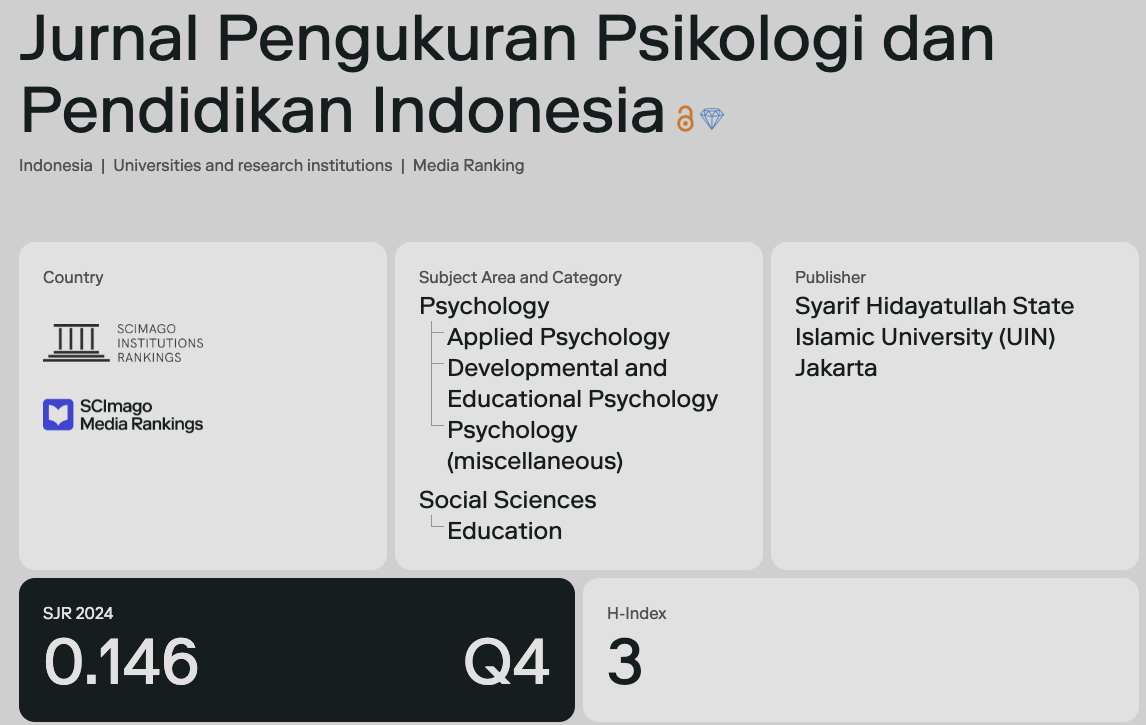Uji Validitas Konstruk Pada Instrumen Academic Anxiety Dengan Metode Confirmatory Factor Analysis (CFA)
DOI:
https://doi.org/10.15408/jp3i.v4i2.9290Keywords:
Kecemasan Akademik, Pola Kecemasan Aktivitas Mental, Kesalahan Atensi, Tekanan Psikologis, Perilaku yang Kurang Tepat, Analisis Faktor KonfirmatorikAbstract
Abstract
Academic anxiety is disturbed mind pattern, physical respond, and behavior in the implementation of academic tasks, that includes pattern of anxiety-engendering mental activity, misdirected attention, physiological distress, inappropriate behavior. The objective of the research is to test the construct validity of the instrument. The data in this research was collected from 265 islamic students of secondary school in Tangerang. Confirmatory factor analysis (CFA) method using LISREL 8.70 software was used. The results showed that all the items that consist of 22 items are unidimensional. That means, all the items only measure one factor model that theorized, so the factor can be accepted.
Abstrak
Kecemasan akademik adalah terganggunya pola pemikiran, respon fisik dan perilaku dalam pelaksanaan tugas akademik, yang meliputi memunculkan pola kecemasan aktivitas mental, perhatian yang salah, tekanan secara fisik, dan perilaku yang kurang tepat. Penelitian ini bertujuan untuk menguji validitas kostruk instrumen tersebut. Data dalam penelitian ini diperoleh dari siswa salah satu MTsN di Tangerang dengan responden berjumlah 265 orang. Metode yang digunakan untuk mengujinya adalah confirmatory factor analysis (CFA) dengan bantuan software LISREL 8.70. Hasil dari penelitian ini menunjukkan bawa seluruh item yang berjumlah 22 item bersifat unidimensional. Artinya seluruh item hanya mengukur satu faktor saja sehingga model satu faktor yang diteorikan tersebut dapat diterima.
References
DAFTAR PUSTAKA
Edward, J.M., & Trible, K. (1992). Anxiety, coping and academic performance. Anxiety, stress and coping, (5), 337-350.
Garcia, C.L. (2007). Dialectic dialogue for academic anxieties in the dissertation process. Diunduh pada tanggal 26 Juli 2012 dari http://www.gestalttherapy.net/writers/garcia.pdf
Matthews, G., Davies D.R., Westerman, S.J., & Stammers, R.B. (2000). Human performance cognition, stress and individual differences. Philadelphia: Psyhology Press.
Matto, N. H., & Nabi, R.(2012). A study on academic anxiety among adolescents. International Journal of SocialScience Tommorow, 1 (3), 1-3.
Milgram, N., & Toubiana, Y. (1999). Academic anxiety, academic procrastination and parental involvement in students and their parents. British Journal of Educational Psychology, 69, 345-361.
Nevid, J.S., Rathus, S.A., & Greene, B.(2005). Psikologi abnormal. Jilid 1. Jakarta: Erlangga.
Ottens, A.J. (1991). Coping with academic anxiety. New York: The Rosen Publishing Group.
Spielberger, C. D. (1966). Anxiety and behavior. New York and London : Academic Press.
Umar, J. (2011). Bahan kuliah statistic. Fakultas Psikologi UIN jakarta. Tidak dipublikasikan.
Zimmerman, B.J. (1989). A social cognitive view of self regulated academic learning. Journal of Educational Psychology, 81 (3), 329-339.








